Artificial Intelligence, Quantum Computing, Fusion Energy, and Semiconductors (AQFS) Research and Training Lab
The AQFS Laboratory is dedicated to advancing scientific discovery, technological innovation, and national resilience by conducting interdisciplinary research in four critical areas: Artificial Intelligence, Quantum Computing, Fusion Energy, and Semiconductors. As part of the CSUSB College of Natural Sciences, the lab provides a platform for Science, Technology, Engineering, and Mathematic (STEM) students and faculty to engage in impactful research that addresses emerging global challenges and prepares students for high-demand careers in national security and advanced technologies. AQFS Lab activities supported by grant Award from Union Pacific Community Ties Giving Program to facilitate faculty research and training activities of students for workforce development. Lab activities are also supported by Vital and Expanded Technologies Initiative (VETI) 2025 Grant Award providing faculty and students with technological resources and equipment needed in support of instruction and research..

Mission Statement
The mission of the AQFS Lab is to contribute to the development of advanced technologies that strengthen national security, promote sustainable innovation, and prepare a diverse and capable technical workforce. Through collaborative research, hands-on learning, and strategic partnerships, we aim to empower students with the skills, experience, and knowledge needed to become future leaders in science and engineering.
Student Engagement and Opportunities
The AQFS Lab is committed to fostering an inclusive and supportive environment where students can explore research interests, contribute to meaningful projects, and develop professional competencies. Opportunities include:
- Undergraduate and graduate research assistantships
- Faculty-mentored research projects
- Capstone project support
- Access to advanced software, computing platforms, and laboratory resources
- Workshops, seminars, and research symposia
- Guidance on conference participation and scholarly publication
Students are encouraged to participate in ongoing initiatives or propose new ideas aligned with the lab’s research objectives.
Research Focus Areas
Artificial Intelligence (AI)
The lab conducts research in the development and application of AI technologies across a range of domains. Current focus areas include:
- Machine learning and neural network architectures
- Large language models (LLMs) and generative AI
- AI ethics, safety, and explainability
- AI applications in scientific discovery, decision support, and defense systems
Students work with industry-standard tools such as Python, PyTorch, TensorFlow, and Hugging Face to develop AI models and explore real-world use cases.
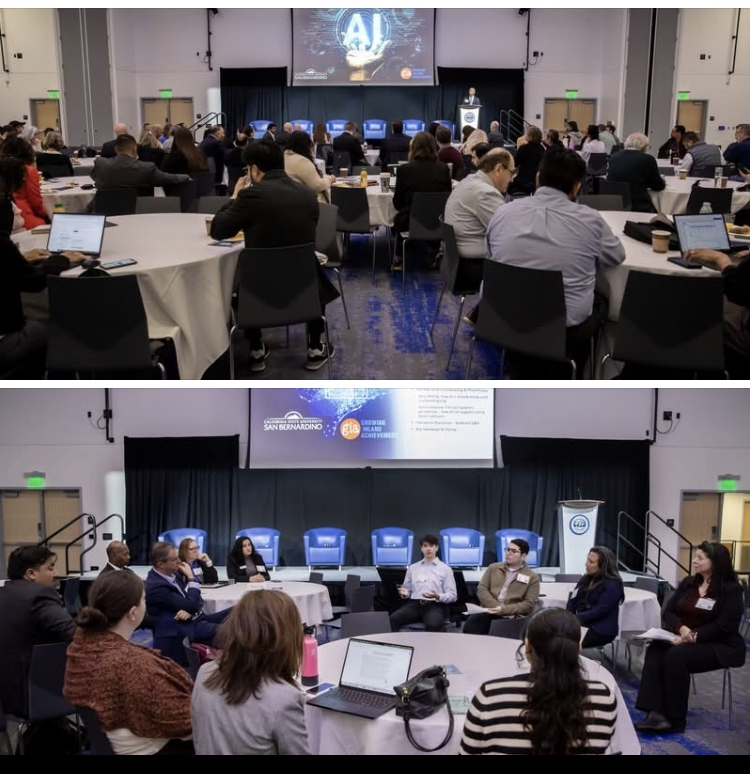
Cybersecurity Training
Training students in AI cybersecurity techniques involves equipping them with the skills to both defend AI systems from cyber threats and use AI tools to enhance cybersecurity measures. As AI systems become more integrated into critical infrastructure and decision-making processes, understanding their unique vulnerabilities—such as model inversion, data poisoning, and adversarial attacks—is essential. Students taught how machine learning models can be exploited, and how to implement robust defenses, including adversarial training, input validation, and secure data pipelines. Integrating foundational topics such as machine learning algorithms, neural networks, and model interpretability lays the groundwork for students to critically assess AI system risks. Training on tools for automating threat detection, anomaly analysis, and predictive defense strategies. Training include hands-on projects where students apply AI techniques—like supervised learning, natural language processing, and reinforcement learning—to real-world cybersecurity use cases. Platforms like Splunk, Darktrace, and open-source frameworks such as TensorFlow and Scikit-learn offer environments for simulating AI-driven defenses.
Cyber Infrastructure Training
Training students in AI cyber infrastructure techniques involves building their expertise in designing, deploying, and managing the complex systems that support artificial intelligence applications in secure and scalable ways. This includes instruction on cloud computing platforms (such as AWS, Azure, and Google Cloud), containerization tools (like Docker and Kubernetes), and high-performance computing environments. Students learn how to configure infrastructure for efficient data storage, parallel processing, and GPU acceleration, while ensuring compliance with security protocols. Topics such as identity and access management (IAM), encryption, and secure API integration are used for protecting AI infrastructure from potential cyber threats. Hands-on labs and projects give students practical experience in automating infrastructure deployment using tools like Terraform and Ansible, as well as monitoring performance and security using platforms like Prometheus and Grafana. Students taught how to integrate continuous integration/continuous deployment (CI/CD) pipelines for AI/ML models, enabling secure and reliable updates.
High Performance Computing Training
Training techniques in high performance computing (HPC) are designed to optimize the efficiency, scalability, and throughput of computational tasks on advanced computing systems. These techniques often involve parallel programming paradigms, such as MPI (Message Passing Interface) and OpenMP (Open Multi-Processing), which enable concurrent execution across multiple processors or nodes. Additionally, GPU acceleration using CUDA or OpenCL is employed to harness the massive parallelism of graphics processing units. Profiling and performance analysis tools are integral to this training, helping developers identify bottlenecks and optimize code. Hands-on workshops, simulation-based learning, and real-world case studies are frequently used to reinforce these concepts and provide practical experience on supercomputers or cluster systems. Training in HPC techniques equips learners to tackle large-scale scientific, engineering, and data-intensive problems with greater speed and accuracy.
Current Participants:
B.S. Research Students | M.S. Research Students | |
| Aaron Reynoso | Jasmin Flores | Farheen Akhter |
| Abdul Bari | Javier Iniguez-Figueroa | Jannatul Faika |
| Alexander Vargas | Joey Castillo | Joaquin Robles |
| Anthony Lopez | Jovani Campa | Laxman Kumar Busetty |
| Austin Li | Julia Reece | Mohammed Arfa Uruj |
| Bailey Caldera | Julissa Zendejas | Rakshanda Thakur |
| Brandon Kirk | Justin Strickland | Shishir Ketha |
| Broedy Crowell | Matthew Boskovich | Xiaoyu Lyu |
| Bryan Adams | Micaella Pena | |
| Brynn Knowlton | Michael Espino | |
| Christian Gomez Diaz | Nadir Esmail | |
| Daniel Santoscoy | Nicholas Fensler | |
| David Solis Gallo | Nor Salah | |
| Diego Montes-Guzman | Omar Gibani | |
| Elizabeth Warren | Rene Ramirez | |
| Ivan Bonola | Richard Ramirez | |
| Ivan Cardenas | Ryan Lopez | |
| Jacob Adams | Shaun Colegado | |
| Jared Gonzalez | Siddhant Srinivas | |
| Viridiana Delgado | Solomon Smith | |
AI Research Opportunity – Open Year-Round!
Join the AQFS Lab for an unpaid undergraduate research experience in Artificial Intelligence. No prior research experience required—just curiosity and commitment!
Topics:
- AI Jailbreaking: Study how people bypass AI safety tools like ChatGPT.
- AI Agents: Build simple autonomous systems that plan and solve tasks.
Details: Open to all Science, Technology, Engineering, and Mathematics (STEM) undergraduate students (all years)
- Time: ~3 hrs/day, flexible
- Location: Remote on Zoom
- Availability: Year-round, including summer
To Apply:
Email Dr. Alzahrani at alzahran@csusb.edu
Subject: AI Research Opportunity
Include a short note about your interest.
Quantum Computing
Quantum computing holds the potential to solve complex problems beyond the capabilities of classical computers. Research activities include:
- Quantum algorithm development
- Quantum circuit simulation and logic gate modeling
- Quantum-enhanced machine learning techniques
- Quantum cryptography and post-quantum security frameworks
Students utilize platforms such as IBM Qiskit and Google Cirq to design and simulate quantum systems.
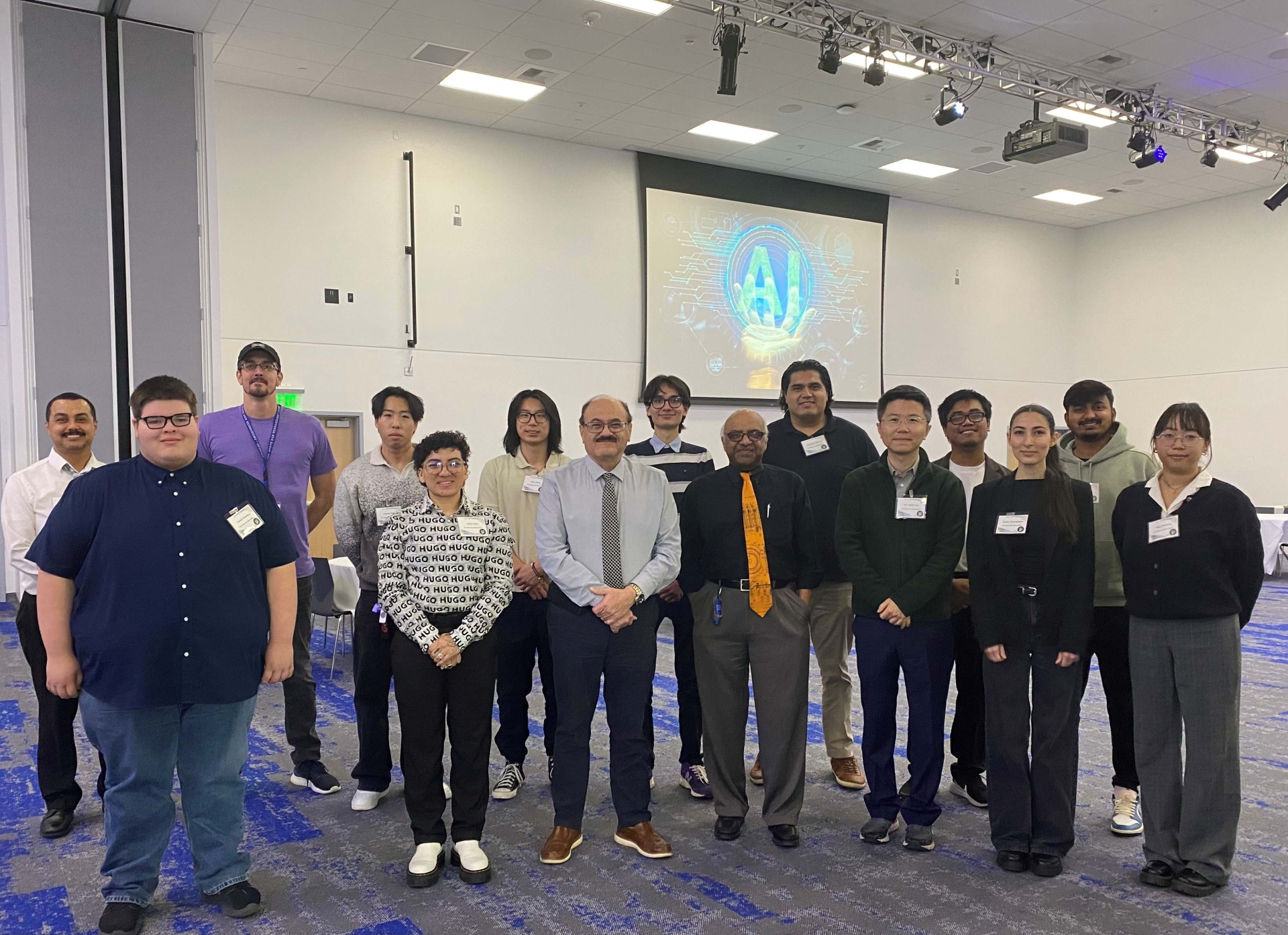

Fusion Energy
Fusion energy research is central to achieving clean, sustainable power sources. Although traditionally rooted in physics, computer science students contribute by:
- Simulating plasma dynamics and reactor behavior
- Developing machine learning models for control and prediction
- Designing software tools for experimental data analysis
- Collaborating on multidisciplinary energy modeling initiatives
These projects often involve high-performance computing and data visualization technologies.
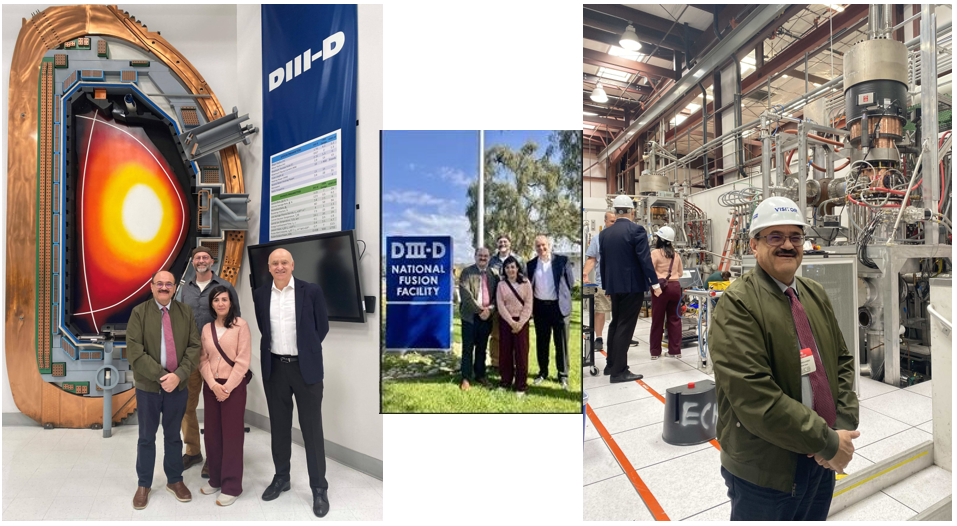
Semiconductor Systems
Semiconductors underpin modern digital infrastructure and are essential to national security and economic competitiveness. The lab explores:
- AI-assisted integrated circuit (IC) and chip design
- Embedded systems and secure hardware architectures
- Energy-efficient logic systems
- Simulation and modeling of fabrication processes
Students gain hands-on experience with digital design, VLSI concepts, and hardware/software integration.
Contributions of CSE Students
The AQFS Lab actively involves students in interdisciplinary projects, with roles such as:
| Research Area | Student Activities |
|---|---|
| AI | Model training and evaluation, ethical AI research, deployment of intelligent systems |
| Quantum | Quantum programming, circuit design, cryptographic analysis |
| Fusion | Simulation of reactor physics, AI for real-time control, data analytics |
| Semiconductors | Hardware modeling, chip design automation, performance and security assessment |
Students collaborate with faculty and peers to contribute to meaningful innovations and gain valuable research experience relevant to industry, government, and graduate education.
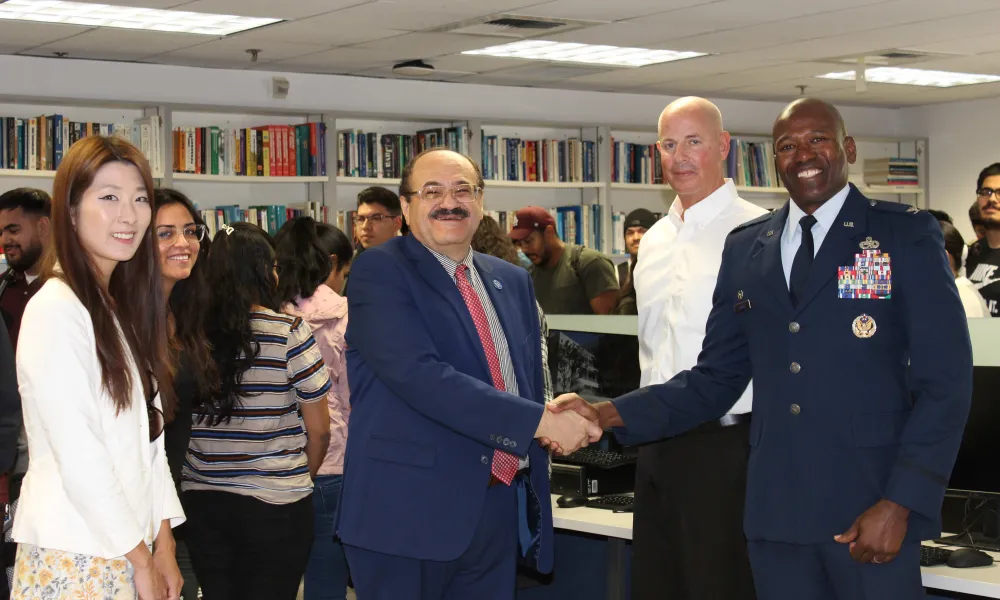
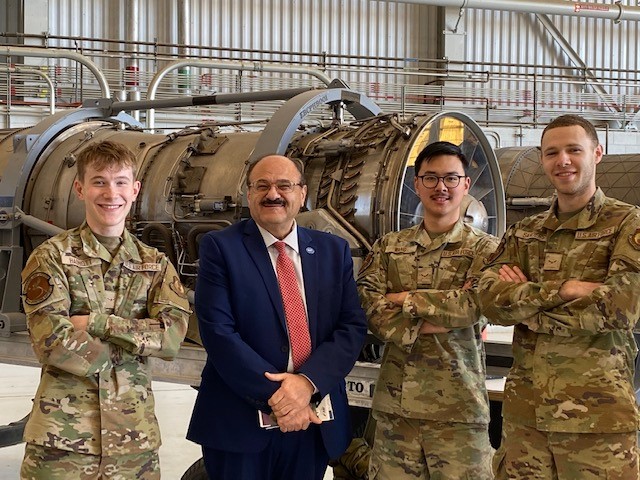
Getting Involved
The AQFS Lab invites undergraduate and graduate STEM students to participate in cutting-edge research initiatives. Interested students may:
- Apply for research assistantships
- Join existing projects aligned with their interests
- Propose novel research ideas for development
- Receive mentorship in preparation for graduate study or national laboratory internships
To learn more or express interest in joining the lab, please contact the lab co-director or visit the School of Computer Science and Engineering.
Research Consultation and Support Services
The AQFS Lab supports CSUSB faculty and students working with complex data or computationally intensive projects. Whether you’re analyzing large datasets or training machine learning models, we can help you maximize your research potential through access to high-performance computing (HPC) and AI expertise.
We offer assistance with:
- High-Performance Computing (HPC): If your research requires more computing power than your personal computer can handle, we can help you access and utilize CSUSB’s campus HPC to accelerate simulations, data analysis, and model training.
- AI for Research: If you are working with large volumes of data — including video, image, sound, text, or PDFs — our team can help you design and build AI models that extract insights, automate analysis, and advance your research goals.
For support or a consultation, please reach out to the AQFS Lab team. We’re here to collaborate and empower your research with cutting-edge tools and expertise.
Contact Information
Lab Location: Jack Brown Building, JB-361
Dr. Khalil Dajani, Chair and Professor
School of Computer Science and Engineering
Director, AQFS Laboratory
Office: JB-307
Email: khalil.dajani@csusb.edu
Phone: (909) 537-5326
Affiliates and Collaborators
Dr. Nabeel Alzahrani
Co-Director of AQFS-Artificial Intelligence
Adjunct Professor of Computer Science and Engineering
Dr. Timothy Akers
Co-Director of AQFS-Quantum
Associate Provost for Academic Research
Cathleen Lucas
Co-Director of AQFS-Research & Training Funding
Senior Grants & Contracts Officer
Dr. Young Kim
Co-Director of AQFS-Fusion Energy
Assistant Professor in the Department of Physics and Astronomy
Dr. Ryan Keating
Co-Director of AQFS-Semiconductors
Professor, Director, Office of Student Research
Gerard Au
Co-Director of AQFS-High Performance Computing
Chief Information Officer, Information Technology Services